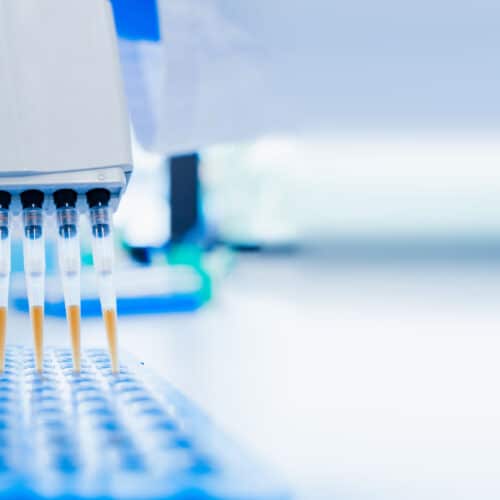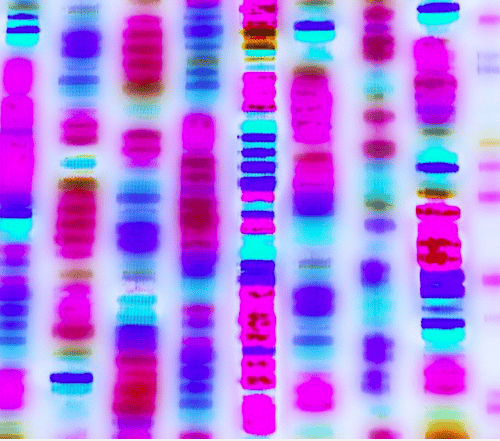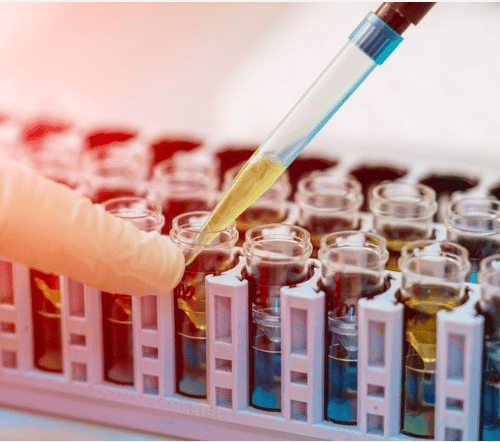Parkinson’s genetics

Approximately 15% of people with Parkinson have a family history of the condition and about 10-20% of Parkinson’s cases are associated with genetic variations that infer a higher risk of developing the condition. In people with ‘early-onset’ Parkinson’s (diagnosed before the age of 50), genetic variations are associated with more cases than later onset Parkinson’s, where the frequency of genetic variations is less common.
It is important to note, however, that having a genetic variation does not immediately mean that someone is going to develop Parkinson’s. There are many people who have these mutations in their DNA and never show any signs of the condition; researchers are trying to establish the factors that influence this situation.
Some of the better studied genetic risk factors associated with increased risk of Parkinson’s, include:
GBA
Small genetic variations in a region of DNA called the GBA gene are linked with an increased risk of developing Parkinson’s; the GBA gene provides instructions for making an enzyme called GCase, or glucocerebrosidase, which enables cells to clear waste compounds effectively. In individuals with Parkinson’s who carry a fault in their GBA gene, GCase function is lowered resulting in faulty waste clearing from cells; so researchers have been looking to identify medicines that can enhance the level of GCase activity in the body thereby potentially slowing the progression of Parkinson’s. One example of this is the cough medication called ambroxol, which Cure Parkinson’s is currently repurposing for Parkinson’s.
LRRK2
Genetic variations within the LRRK2 gene are also recognised as being some of the most common with regards to increasing a person’s risk of developing Parkinson’s – LRRK2 variants are present in approximately 1-2% of all cases of Parkinson’s.
PINK1
The PINK1 gene runs in families and is associated with early-onset Parkinson’s; PINK1 provides instructions for cells to make a protein called PTEN induced putative kinase which is present in the mitochondria of cells throughout the body. Mitochondria are the ‘battery packs’ in cells used to produce the energy they need to function.
Scientists believe PTEN induced putative kinase protects mitochondria when cells are under stress, and mutations in the PINK1 gene could then mean that mitchondria are not protected as well. Mutations of the PINK1 gene are rare, but scientists believe they may contribute to early-onset Parkinson’s disease.
PRKN
The PRKN gene is responsible for making a protein called parkin and many PRKN gene variants have been linked to Parkinson’s. PRKN is the most common variant associated with early-onset Parkinson’s; those people with Parkinson’s who have this gene may experience early symptoms such as slowness of movement and freezing.
Research has shown that PRKN gene variants cause a dysfunctional version of the parkin protein which may affect the production of dopamine. In people with Parkinson’s, the brain gradually stops making dopamine leading to the characteristic problems of Parkinson’s, associated with movement and balance. Variants in the PRKN gene may also affect mitochondria – the energy sources of cells, and research suggests that this dysfunction could play a role in causing Parkinson’s. Researchers are studying treatments that could enhance parkin protein activity.
Importantly, understanding what the connections are between Parkinson’s and the underlying genetics can help us to further comprehend how the condition develops and progresses, and how we can treat it and ultimately cure it.
There are now a number of clinical trials testing drugs in people with Parkinson’s who also have certain gene mutations.
More information about genetics
Webinar – Targeting the Genetics of Parkinson’s Ambroxol and Parkinson’s The epigenetics of Parkinson’s. Something ‘LRRK -ing’ in the data
A new potential biomarker for Parkinson’s
Researchers at Duke University have recently presented data on a new potential biomarker for Parkinson’s.

New research exploring ethnic diversity in Parkinson’s
A recent study from the Global Parkinson’s Genetic Program found a novel genetic risk factor for Parkinson’s in people of African ancestry. This finding once again brings to light…

A new case for GCase
Low levels of a protein called GCase is associated with an increased risk of developing Parkinson’s. New understandings of the role of GCase could help to further explain other…

New clinical trials targeting the LRRK2 gene
LRRK2 is a protein that becomes hyperactive in some people with Parkinson’s, and this is believed to be involved in the progression of their Parkinson’s.

Research Update Meeting Spring 2023 – recorded to watch again
Our popular and much-awaited research update meeting brought together two leading clinicians to report on their individual area of expertise for Parkinson’s. It’s available to watch again!

The role of faulty cell protein in Parkinson’s
A process called m6A mRNA methylation is reduced in people with Parkinson’s. Research is underway to develop drugs that can improve this protein production process.

Phase 3 clinical trial of ambroxol for Parkinson’s confirmed
Cure Parkinson’s is pleased to announce that a large-scale phase 3 clinical trial of ambroxol, to determine whether the drug can slow the progression of Parkinson’s.

GCase and Parkinson’s: a new perspective
Recently researchers have provided new insights into how small defects in a region of DNA called the GBA gene could be affecting cell biology leading to Parkinson’s.

PD Frontline
As research has expanded in the area of Parkinson’s genetics, researchers have been able to uncover a number of genes which have been linked to an increased risk of…

Something ‘LRRK -ing’ in the data
Over recent years, researchers have been identifying genetic variations associated with an increased risk of developing Parkinson’s. A recent study has thrown further light on the connection between certain…

Important phase 1 trial results for LRRK2 inhibitor drug
This week the biotech company Denali Therapeutics announced the results of a phase 1 clinical trial of their LRRK2 inhibitor drug called ‘DNL151’. Their findings have interesting implications for…

Results of the MOVES-PD trial announced
MOVES-PD is a global phase 2 study to assess the efficacy and safety of the drug venglustat in Parkinson’s patients who have a GBA-1 gene mutation. Sanofi designed the…

Ambroxol – new real-world data
Ambroxol is a cough medication that Cure Parkinson’s is repurposing for potential use in treating Parkinson’s, and recently published data provides further support for this pioneering new study.

The AIM-PD trial (ambroxol)
Supported and funded by Cure Parkinson’s, Van Andel Institute and the John Black Foundation, the next phase of this trial programme will follow shortly. Phase 2 of the ‘AIM-PD’…

The epigenetics of Parkinson’s.
Researchers at the Van Andel Institute in Grand Rapids (Michigan) have identified a “master regulator” gene switch that may protect the brain from neurodegenerative processes associated with Parkinson’s.

DENALI and Biogen team up against LRRK2
The biotech company Denali have announced that they have signed a collaborative deal with the pharmaceutical company Biogen.

A greater role for the parkinson’s GBA gene protein?
There is a great deal of variability between each person affected by Parkinson’s. Better knowledge of these variables could not only provide insights into the underlying biology of…

The STEADY-PD Trial Results
Cure Parkinson’s recently approved funding for a project with Associate Professor Antony Cooper, Garvan Institute, Sydney. The project aimed to determine if there is a group of people with…

Ambroxol in Parkinson’s: results of phase 2 trial published
Cure Parkinson’s, in partnership with Van Andel Institute and the John Black Charitable Foundation, is proud to announce the publication of the results of the phase 2 clinical trial…

Keeping Pace with LRRK2 and GCase
There are a number of genetic variations that can increase one’s risk of developing Parkinson’s. Two of the most common genetic variations or mutations occur in regions of human…

GP2: global Parkinson’s genetics program
In almost every cell of a human body, genetic material or DNA is translated into proteins, referred to as genes. These genes provide the instructions for making and maintaining…

Ambroxol: Further validation for potential in Parkinson’s
Small variations in DNA are associated with approximately 1 in 5 of Parkinson’s cases. One of the most common genetic risk factors of developing Parkinson’s occurs in a region of…
